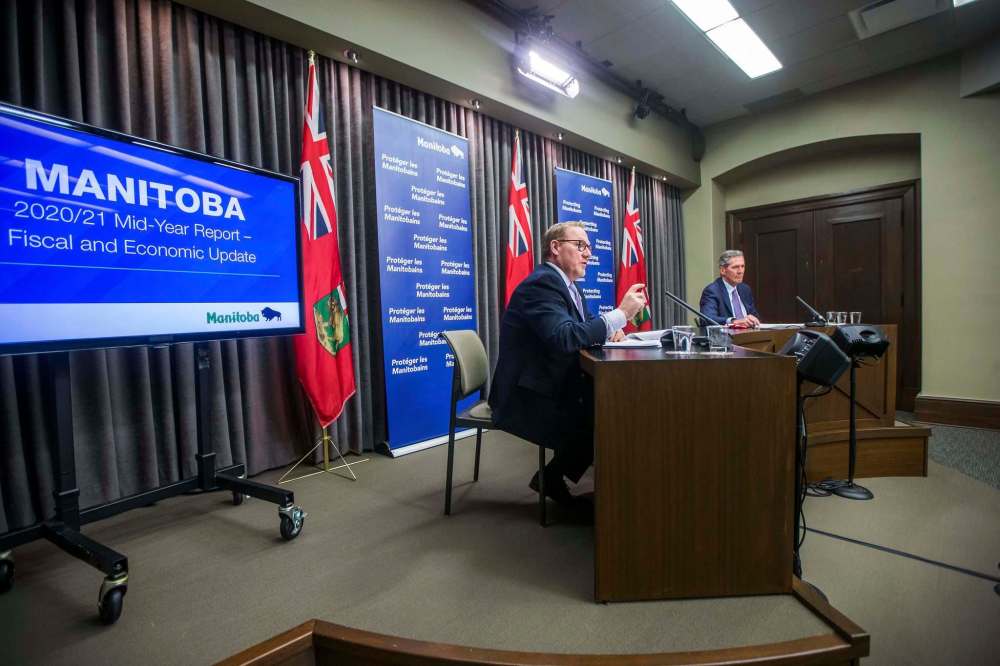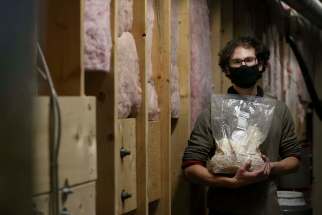Projected deficit offers wiggle room on small-business compensation
Read this article for free:
or
Already have an account? Log in here »
To continue reading, please subscribe:
Monthly Digital Subscription
$0 for the first 4 weeks*
- Enjoy unlimited reading on winnipegfreepress.com
- Read the E-Edition, our digital replica newspaper
- Access News Break, our award-winning app
- Play interactive puzzles
*No charge for 4 weeks then price increases to the regular rate of $19.00 plus GST every four weeks. Offer available to new and qualified returning subscribers only. Cancel any time.
Monthly Digital Subscription
$4.75/week*
- Enjoy unlimited reading on winnipegfreepress.com
- Read the E-Edition, our digital replica newspaper
- Access News Break, our award-winning app
- Play interactive puzzles
*Billed as $19 plus GST every four weeks. Cancel any time.
To continue reading, please subscribe:
Add Free Press access to your Brandon Sun subscription for only an additional
$1 for the first 4 weeks*
*Your next subscription payment will increase by $1.00 and you will be charged $16.99 plus GST for four weeks. After four weeks, your payment will increase to $23.99 plus GST every four weeks.
Read unlimited articles for free today:
or
Already have an account? Log in here »
Hey there, time traveller!
This article was published 17/12/2020 (1821 days ago), so information in it may no longer be current.
Premier Brian Pallister’s stubborn claim his government can’t afford to adequately compensate small businesses hurt by the COVID-19 pandemic just got a little tougher to sell.
Two days after lecturing small operators to tighten their belts, Pallister announced Manitoba’s projected deficit for 2020-21 dropped by nearly one-third, to just over $2 billion.
Manitoba projects lower deficit of $2B as 'significant uncertainty' remains

Posted:
After going on a wild roller-coaster ride since the pre-pandemic budget in March, Manitoba’s deficit is expected to be nearly $1 billion lower than the $2.9 billion projected in September, the province said Thursday.
It doesn’t put the province on solid financial footing — not even close — but compared to the $3-to $5-billion shortfall projected earlier this year, it gives government more flexibility.
Pallister can thank the federal government. Ottawa provided Manitoba with $648 million in COVID-19 funding, the main reason for the lower deficit.
The province’s own-source revenues also improved.
Income, corporate and sales tax revenues didn’t decline as much as expected. Education property taxes were projected to fall $60 million, but they’re back to original budget levels. Also, fee revenue, including automobile licensing, is $244 million better than what Manitoba Finance projected in its first-quarter report in September.
That’s, of course, offset by higher spending, including $188 million more in health care.
All told, provincial finances are $890 million better than they were three months ago.
That makes it more difficult for Pallister to argue the province can’t afford to adequately compensate businesses driven to bankruptcy or near-insolvency as a result of mandated shutdowns.
Whether those interventions — such as shuttering bars, restaurants, and retail outlets — were necessary or not, there’s no question those operators have been disproportionately affected. Many have lost their livelihoods, through no fault of their own.

The province has provided some financial aid to small business, but it’s not nearly enough to compensate operators for their losses. For others, it was too late.
Pallister was reluctant to compensate small businesses at all early in the pandemic, even after imposing restrictions. It wasn’t until he faced sustained criticism he finally relented.
Even then, the first round of programs was stingy. The Manitoba Gap Protection Program, for example, disqualified businesses that received federal aid. That’s partly why the $120 million budgeted for it was undersubscribed by $52 million (an amount later rolled into the Manitoba Bridge Grant program, which doesn’t have those restrictions).
Pallister had to be pressured for weeks to improve support for small business. He doesn’t like spending money; it’s in his DNA.
Those miserly qualities served Manitobans well when they needed someone to clean up the province’s balance sheet between 2016 and 2020. Manitobans needed fiscal discipline and Pallister delivered, eliminating a deficit of nearly $1 billion in four years, with relatively little pain (and a lot of help from Ottawa).
No one is suggesting the province go out and blow $890 million because the projected deficit declined as much. However, government should spend some of it to compensate those who have sacrificed their businesses for the greater good. We have an obligation, as a society, to do that.
The world has changed since then. Manitoba still needs a financially responsible government, but it also needs a good financial manager — someone who understands that, during a severe economic downtown like the one we’re in, government needs to stimulate the economy to bolster aggregate demand.
In a pandemic, where government restrictions are used to mitigate the spread of an infectious disease, it also means compensating those disproportionately affected.
No one is suggesting the province go out and blow $890 million because the projected deficit declined as much. However, government should spend some of it to compensate those who have sacrificed their businesses for the greater good. We have an obligation, as a society, to do that.
When the economy recovers, Manitoba needs a long-term plan to balance the books, but that’s a long way off.
Right now, it doesn’t matter if government posts a $2-billion or $2.5-billion deficit in 2020-21; nor whether debt as a percentage of GDP is 38 per cent or 39 per cent.
What’s important is government spends whatever is necessary to fight COVID-19, to save lives, and to compensate people who have sacrificed the most.
That’s job No. 1.
tom.brodbeck@freepress.mb.ca

Tom has been covering Manitoba politics since the early 1990s and joined the Winnipeg Free Press news team in 2019.
Our newsroom depends on a growing audience of readers to power our journalism. If you are not a paid reader, please consider becoming a subscriber.
Our newsroom depends on its audience of readers to power our journalism. Thank you for your support.







